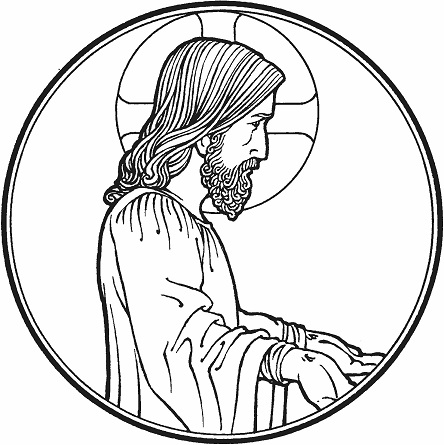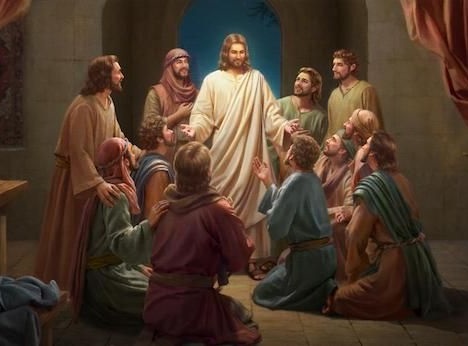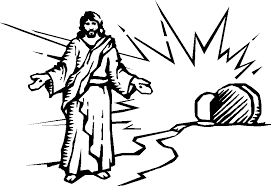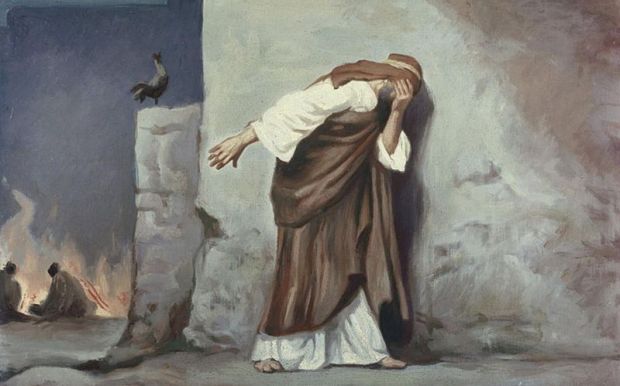Readings: Ezekiel 37:1-14 | 1 John 5:4-10 | John 20:19-31
Text: John 20:19-31
On the evening of the Resurrection, the disciples—at least ten of them—saw the risen Lord! Sometimes we get to thinking the disciples must have had an easier time because they had Jesus in the flesh. After all, what quality of teaching! What a strengthening of faith to see the healings being done, the demons cast out, even the dead raised. On Palm Sunday, John comments that many of the crowd had come because Jesus had raised Lazarus from the dead.

Many times, Christians have thought of the time of the Apostles as the “glory days” of the Church. They were so close in time and space to the events which we only get to hear about over the centuries and miles! Even the book of Acts has a certain luster about it, because the eyewitnesses were proclaiming—and sometimes thousands became believers at once. It’s so appealing that many times movements start in the more modern Church that want to get back to those “glory days”—ones like the Pentecostals, the Church of Christ, and communist utopian colonies.
And so in these “gray and latter days,” we can hope that we had a confession that was more visually convincing. If only we too had Jesus physically present with us, then perhaps people would believe and be saved. If only our own congregation had something more appealing, then we could reach more people, worship with more, sing more vibrantly…
However, the truth is that the apostles and the disciples afterward experienced the same amount of resistance to the ministry of Jesus. As was mentioned last week on Easter itself, some of those who saw were the harshest critics. At Nazareth, “[Jesus] could do no mighty work there, except that he laid his hands on a few sick people and healed them” (Mk. 6:5).
Even His own disciples proved to be an obstacle when, “they were bringing even infants to him that he might touch them. And when the disciples saw it, they rebuked them” (Lk. 18:15). This should bring even more clarity to the truth that God’s ways are higher than our ways [Isa. 55:9]. Last Sunday, too, the women saw the empty tomb and heard the message of the angel, but at first “they said nothing to anyone because they were afraid” (Mk. 16:8).
So also, here in today’s Gospel, we find the disciples locked up as if man had prevailed. Thomas, who had once boldly said, “Let us also go, that we may die with him” (Jn. 11:16) and saw Lazarus raised from the grave now refuses to believe that Jesus is the Resurrection and the Life [Jn. 11:25]. These are the “glory days” of those closest to the Lord?

In fact, they remained timid even with the Resurrected Lord with them, going about their daily business as if not much had changed with His Resurrection. You would think that this great ordination of the apostles to be “sent as the Father has sent Me” combined with Thomas’ awe-struck “My Lord and my God!” would yield some transformation. But, immediately after this climax, the disciples are right back to going fishing, as if it were “Monday morning” and time to get back to work.
So, if those who saw the Lord were still so darkened in their understanding, why would we long for that? Hear the Word of the Lord Jesus: “Blessed are those who have not seen and yet have believed.”
We are those who hear the Lord. The disciples saw the Lord (v. 20), but ever since the Ascension, the Church hears Him speak (v. 21). We are a Church that is built firmly and solely on the Word of God. By the Word, the heavens and the earth were created [2 Pe. 3:5], and by that same Word the peop0le of God now live and breathe.
He has given us the reliable eyewitness of the apostles. They did see the Lord, and they were witnesses from the beginning, as Peter said when Matthias was appointed: “So one of the men who have accompanied us during all the time that the Lord Jesus went in and out among us, beginning from the baptism of John until the day when he was taken up from us—one of these men must become with us a witness to his resurrection” (Acts 1:21-22) In their preaching and their writings—which are the New Testament—they made repeated reference to the fact that they were first-hand witnesses of what the Lord had done,[1] and they were appointed by Him to write these things “that you may believe that Jesus is the Christ, the Son of God, and that by believing you may have life in his name” (v. 31).
This Word is no ordinary babble of man. We’re surrounded by words—even listening to words this moment—but the Word of God is living and active. The Risen Lord, to whom “all authority in heaven and on earth has been given” (Matt. 28:18) imbues His Word with His power to make disciples and teaching them, and keeping them steadfast in this faith unto the end.

He has given us His Spirit: “But the Helper, the Holy Spirit, whom the Father will send in my name, he will teach you all things and bring to your remembrance all that I have said to you.” (Jn. 14:26), which is better for us, because the Lord also says, “I tell you the truth: it is to your advantage that I go away, for if I do not go away, the Helper will not come to you. But if I go, I will send him to you” (Jn. 16:7). It was by the power of the Spirit with the Word that “more than ever believers were added to the Lord” (Acts 5:14).
But just because we don’t see Him with our eyes does not in any way mean He isn’t present with us. Often, people get into trouble when they look for an assurance of the Lord’s presence outside of His Word. Consider these dead ends:
- Looking for the Lord’s presence in circumstances—when things are going well, the Lord must be with us. When they aren’t, He must not care. Not so for the Lord, whose “steadfast love endures forever” (Ps. 136:1)
- Looking for the Lord in emotions or experience, when we have a certain feeling that we equate with His presence. So many of our fellow Christians are led to believe that by the popular and shallow events which are called “times of worship.” But feelings are always changing. Rather, “Everyone then who hears these words of mine and does them will be like a wise man who built his house on the rock. 25 And the rain fell, and the floods came, and the winds blew and beat on that house, but it did not fall, because it had been founded on the rock.” (Matt. 7:24-25) And that foundation of Rock comes from the Word, not from our fickle feelings.
The promise and the promise is with the Word of the Lord: “Peace be with you” v. 19: By these words, the Lord opens the gates of heaven and slams the pit shut on Satan and all of your sins. His death and resurrection to eternal life have freed you.

“Receive the Holy Spirit. If you forgive the sins of any, they are forgiven them; if you withhold forgiveness from any, it is withheld” He still sends His Holy Spirit by speaking in our midst here. As He speaks to us and through us, that peace which looses sins comes to those who hear and believe—here in corporate worship, at home with your family, with strangers you meet. He lavishes the forgiveness He won through us.
You are blessed because it is completely by His work that you believe. It wasn’t because He took away all your problems; it wasn’t because you had a feeling He was with you; and it wasn’t because the lighting was just right. It is because the Holy Spirit has given you faith that your sins are forgiven and you are in His Kingdom forever.
But if you believe His Word, believe also the signs He gives: Baptism and the Lord’s Supper. His Baptism saves and His Supper truly is what He says.
In the Name of the Father and of the + Son and of the Holy Spirit. Amen.

[1] Acts 2:32, 5:32, 10:39, etc.













